You might not know the name Power Up Audio, but you’ve heard the team’s work. Every time Madeline dashes in Celeste, a tank fires in Into The Breach, or a monster terrifies you in Darkest Dungeon, you’re hearing the sounds they’ve created.
But when I meet the members of Power Up Audio on a rainy December night in Vancouver, Canada, the low headcount is striking. Despite working on major titles, including the recently released Darksiders Genesis and the multiple-award-nominated Cadence of Hyrule, Power Up has done it all as a small Canadian team without an office.
We’re seated at a bar on Vancouver’s Main Street, and there’s a great sense of pride in the air, alongside plenty of camaraderie and laughter. The two owners of Power Up Audio, Jeff Tangsoc and Kevin Regamey, tell me that this was the intention for their company, that everyone has a sense of belonging. Even though they’re the owners, the other three employees still poke fun at them frequently. If I didn’t know the group, I’d find it almost impossible to separate the bosses from the staff.
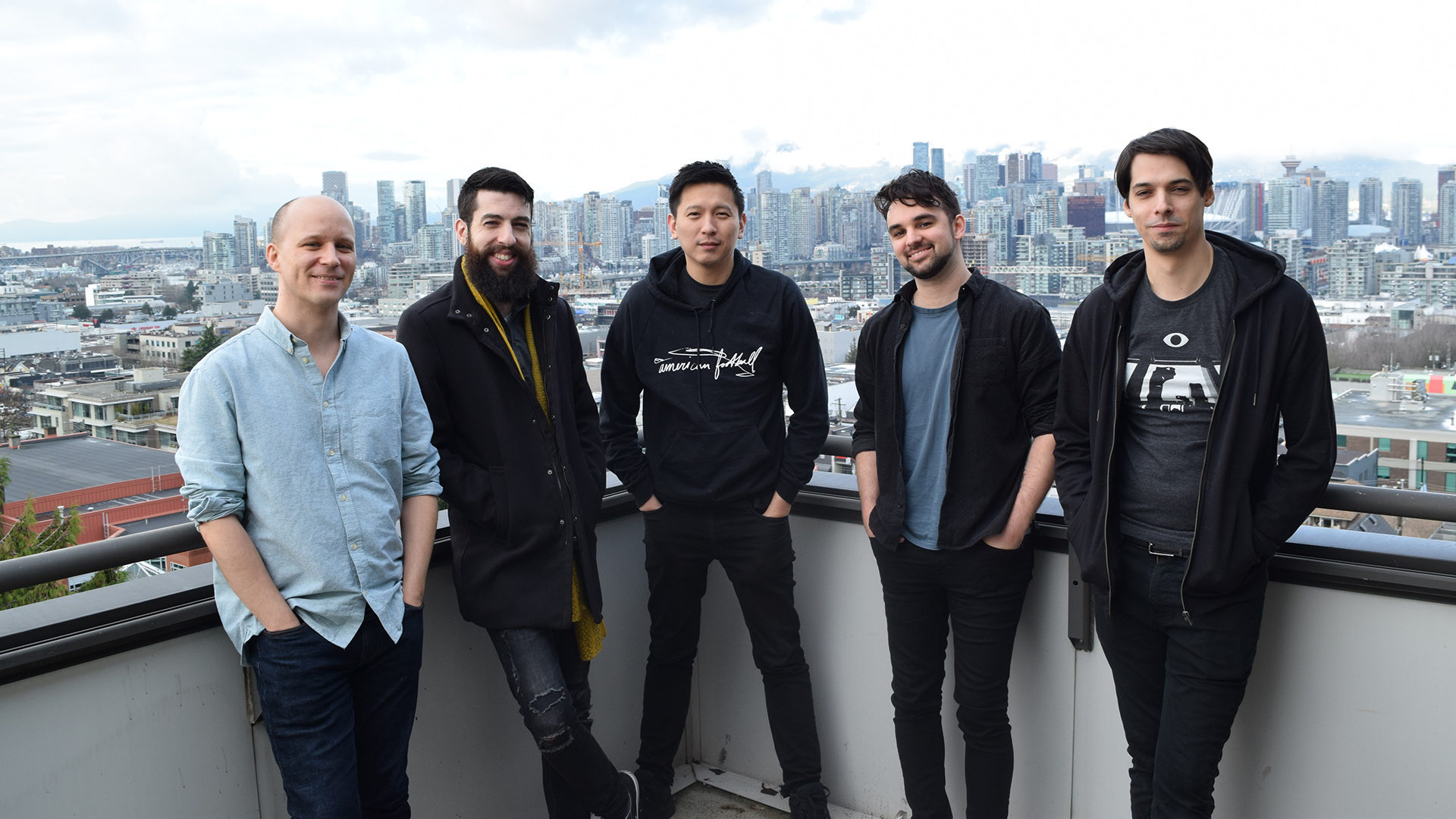
Credit: Omri Wallach for EGM
It’s the polar opposite of what Tangsoc and Regamey experienced at their old jobs, and why they struck out to form Power Up in the first place. The two met while working at a large commercial studio that designed sounds for games and apps, where the name of the game was quantity over quality. To outsiders and clients, the large, third-party studio projected an image of having equally large and dedicated teams on each project. Behind the curtain, it was just Tangsoc and Regamey on the game audio team, and they were kept in the dark. They weren’t allowed to communicate with clients, ask questions, or make suggestions. All they got was a shopping list of sounds.
“It felt like we were actively barred from communication,” Regamey said. “There was a lifestyle of distrust.”
The major catalyst for change—besides the two realizing that they were both casually looking for new jobs—came when Regamey wanted to talk to a developer. He had been assigned to work on a game that, it turned out, was incredibly good and addictive. Regamey alternated from working on audio for the game to playing in his off time, and eventually, he got so good that he started breaking the game and racking up scores that should have been impossible. After some deliberation, and against the wishes of his employer, he decided to reach out.
“I contacted them through their inquiry form on their website, even though I was doing the sound design for the game,” Regamey said. “I felt like I was breaking the rules. But the thing is, he was thrilled to hear that someone had received the game so well. We had this great conversation. That kind of opened my eyes that we could actually be collaborative and enjoy working on creating a thing.”
That idea became a dream for Tangsoc and Regamey, and as they started saving up money and getting ready to quit, it evolved into a goal. The duo would create a sound design studio that actually collaborated with game developers, and they’d work on games that they actually wanted to work on. But to do that, the duo had to start meeting people.
From the get-go, the new team of two hit the ground hard. They attended game conferences, they scoured company postings and LinkedIn, they researched their contacts, and they cold called a lot. The first attempts at outreach, however, were less than successful.
“My first cold call I was [timidly] like, ‘Hi, do you need sound?’” Tangsoc said. “The guy on the other end of the phone was like, ‘Don’t ever fucking call me.’”
Regamey laughed as Tangsoc recalled the memory. “And then you called me and were like, ‘Kevin, I can’t do this.’”
But the duo persisted. From that first cold call to a conservative estimate of more than 600 since, Power Up started getting its name into the world. One method involved redesigning all of the audio for game trailers and sending the redux versions to developers, which didn’t land them a gig but got an “almost universally positive” reception.
Eventually, Power Up started to land a few small contracts. They even received contracts from people who had seen their trailers and, a few years later, remembered the team when looking for sound designers. The duo also kept networking, volunteering their know-how at the Summer Games Done Quick charity speedrunning marathons and at local Vancouver game jams. It turned out that the factory-like conditions that the Power Up owners had worked under were perfect preparation for game jam environments, and Regamey contributed on-the-fly sounds for many aspiring projects.
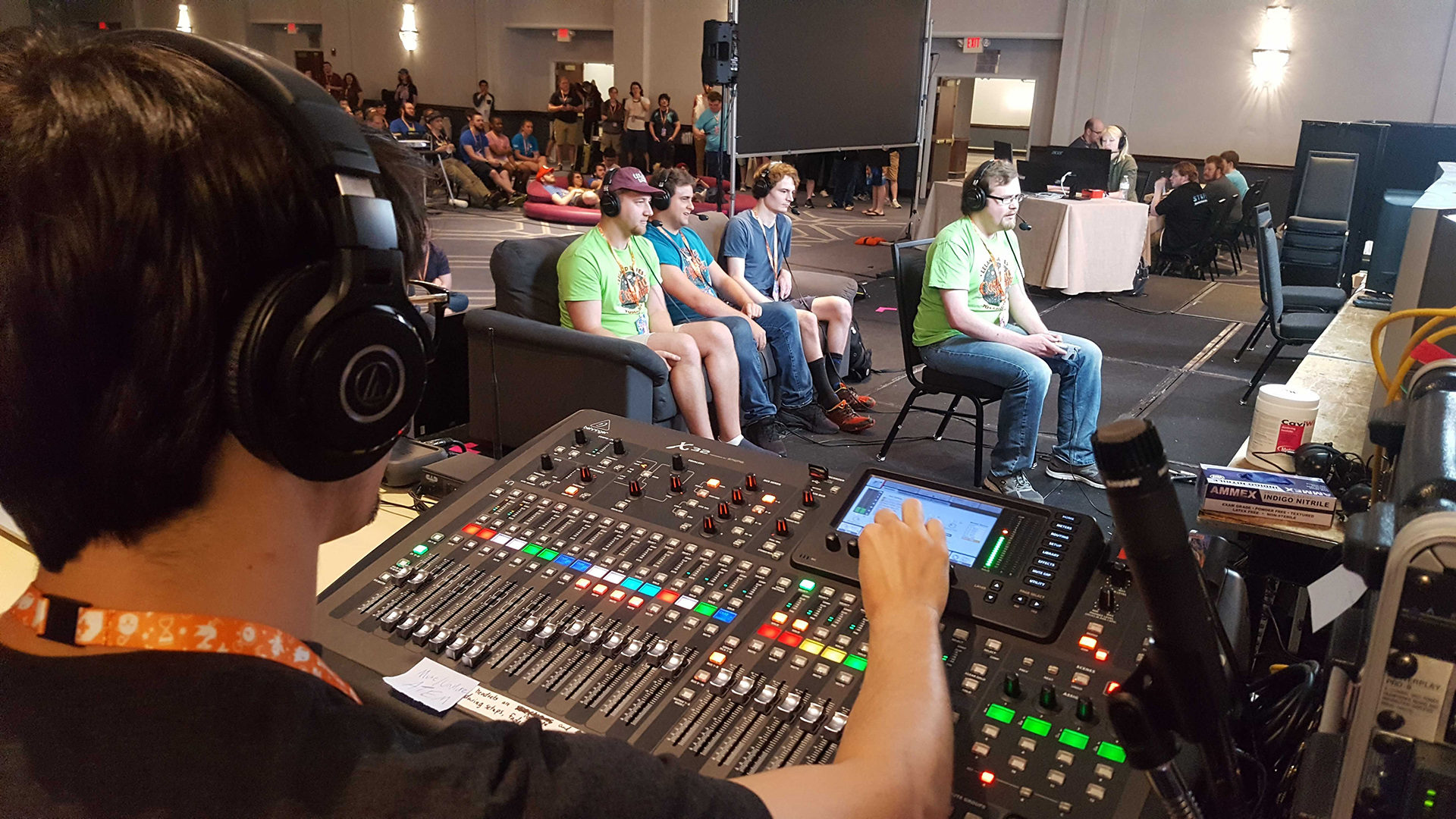
Courtesy Games Done Quick
At the 2012 Vancouver Full Indie Game Jam, his work got noticed by two indie developers who were working on their own project, Noel Berry and Chevy Ray Johnston. Though they didn’t need audio, they got to know Regamey. A few months later, at the 2013 Global Game Jam, their friend and roommate Matt Thorson needed sound design for TowerFall.
“They had a skeleton-crew team of Matt doing gameplay and Alec [Holowka] doing the music, but he didn’t want to do the sound effects, so they were like, ‘Oh, what about these guys?’” Tangsoc said. “They invited us to Indie House and right away we said we’d love to work on the game.”
TowerFall became the in that Power Up needed. The game garnered tons of attention and rave reviews even before release, quickly becoming a favorite among game developers. The Power Up duo got to attend parties at Indie House and meet other devs who loved the game and the sound work they contributed. One of them was Ryan Clark, and he started talking to them about doing the sound for his new “rhythm roguelike” game, Crypt of the Necrodancer.
“It was the first time that we actually felt that were doing well, that we weren’t looking for other jobs on the side,” Tangsoc said. “I thought at first about working retail on the side.”
By this point, Power Up had started to get a healthy amount of contracts, to the point that the founding duo realized they needed additional help. Initially, Power Up didn’t think they could support an employee while figuring out their company, but they found a local sound design graduate named Joey Godard, who had actually gotten their business card while working at a restaurant the duo used to frequent. Godard became their first contractor, and less than a year in, he had already helmed one of the company’s big projects, Mushroom 11. He quickly became the first official employee for Power Up, just in time for what would be the company’s biggest gamble.
At a 2013 GDC party in San Francisco, Regamey ended up talking to a veteran developer named Tyler Sigman that had recently turned indie and had started work on a new project. The game, co-developed by Sigman at the newly founded Red Hook Studios, would become Darkest Dungeon, but there was a catch. The project would be funded entirely through Kickstarter.
“It was interesting because they just said, ‘We have no money.’ And I went to Kevin and said, ‘We have to go all in,’” Tangsoc recalled.
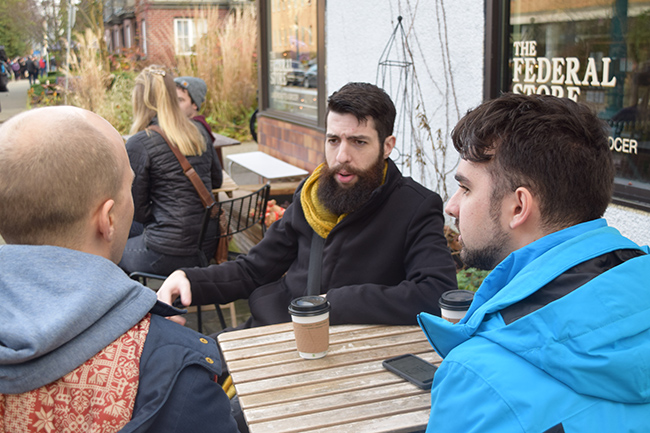
Credit: Omri Wallach for EGM
It might seem antithetical, but the project embodied what Power Up’s owners wanted the company to do. Already they were more involved than any other sound design studio, attending conferences alongside clients and helping to promote and demo their games, but the dream was to collaborate directly. Power Up wanted to be more than a third-party audio house. They wanted a seat at the table.
Power Up pitched a royalty agreement for working on Darkest Dungeon, which Red Hook Studios was happy to sign. After plenty of back and forth coming up with the best terms (since it was Tangsoc and Regamey’s first time figuring out royalties), the deal was struck. Now, the Power Up team weren’t just sound designers, they were stakeholders directly involved in the project, and the Darkest Dungeon experiment ended up playing a pivotal role in shaping the company. The team designed the sounds of course, but they also consulted on everything from the narration to the layering of additional background noises depending on the player’s torch meter. They even playtested the game, offering feedback on parts that were too easy.
In designing the game’s soundscape, the team wanted to double down on the game’s mood and make interactions feel organic. Darkest Dungeon was a PC game filled with clicking, but Power Up ensured the players heard more of the world and less of their mouse.
“When you click on the ability Gallows Humor, you don’t hear the click of the mouse, you hear an old man laughing in the background,” Tangsoc said. “A lot of them are based on just the feelings you would get. It’s psychology, basically.”
Being avid gamers, Power Up wanted to make the best game possible, so they put everything into the game. When you consider the amount of enemies that needed voicing in Darkest Dungeon, that statement becomes quite literal. Most of the enemy voices in the games are theirs, with the small team often holding impromptu auditions over video calls. When they needed a noise for a crow boss, everyone did their best crow impressions. At the bar, Regamey regaled me with the incomprehensible mumbling he provided for the Madman enemy.
“His voice was singling out a word like doom or death,” Regamey said, “and then for the rest I used a random word generator. So I spoke the words, added doom in the middle which was audible, and the rest was nonsense.”
The team tinkered, iterated, and communicated their ideas to Red Hook Studios through Tangsoc, the project lead. The owners wanted each project to have one lead in charge, who would not only allocate the work (or do the majority by themselves) but also serve as the liaison between Power Up and the client. Usually this was the person with the closest relationship, but oftentimes it was also the person who was the most passionate about the project.
Once Darkest Dungeon was released into Early Access and people started getting their hands on the game, the Power Up team saw its gamble had paid off. The game was a huge success, beloved by streamers and reviewers alike, with plenty of praise lauding the dark and foreboding ambiance of its many dungeons. Thanks to their hard work (and the deal they’d negotiated), Power Up was a success. Their business model would work.
The team started looking for more projects to partner up on, and used their multiple successes to seal the deal. Tangsoc and Regamey also realized that their success came from how involved and confident everyone was in their work, and decided to approach projects democratically. Everyone has a say in whether or not to take on a game, and if one person doesn’t want to do it, they don’t follow through. Maybe they think the concept won’t be successful, or scheduling the project is impossible. Sometimes, it’s a simple case of the payout not making financial sense.
As Power Up has increasingly taken equity in the projects they’re working on, it’s important for everyone to be on board. Often they’re doing far more than just sound effects, having now established themselves as having good ears and eyes for games. If the project doesn’t have a composer, the team will make some suggestions. If a game needs voice actors, Power Up will work with an agency to cast the roles, or work with the developer on a different plan for dialogue to make localization easier (as was the case with Celeste).
And they’re on the repositories for the games they’re working on, playing demo builds as soon as they’re ready and helping out with playtesting. Regamey, a practiced speedrunner, recalled doing most of the QA for Celeste’s final DLC, Farewell, on a laptop while on vacation in Hawaii.
“We’re very on the team,” Regamey said. “Anything we do to benefit the project helps us too, right, so we try to entrench ourselves as partners on the project.” Case in point: At the 2019 BAFTA Games Awards, Tangsoc joined developer Matthew Davis onstage when Into the Breach won the Original Property award.
As they’ve grown to be more involved in their projects, the Power Up team has been able to become more selective. The owners estimate that the studio had around 60 small contracts after their first year of operation, while today they’re working on about a dozen games. Some of the projects they’ve turned down would have seen Power Up scale up to as many as 14 members, but they’ve been adamant to remain the same small Canadian studio.
By the time they did decide to scale up, it was from three members to five, and Power Up’s success meant people started coming to them. As Regamey and Tangsoc had done when they started out, the newer employees had networked hard, and earned their roles by making regular appearances and interactions with the company. One of the new hires, Cole Verderber, first came onto their radar after he and a group of friends cosplayed as characters from TowerFall.
But even as Power Up has succeeded in growing its success, its team, and its reputation, it has done so out of individual home offices. The owners conduct semi-regular searches for a dedicated office, but finding real estate in Vancouver has become famously difficult and expensive over the last few years. To make matters worse, landlords aren’t keen on tenants that work with audio.
“We had a few close calls, but at the last minute they fell through,” Tangsoc said. “Usually it’s, ‘Well, the building manager doesn’t want to deal with your loud stuff.’”
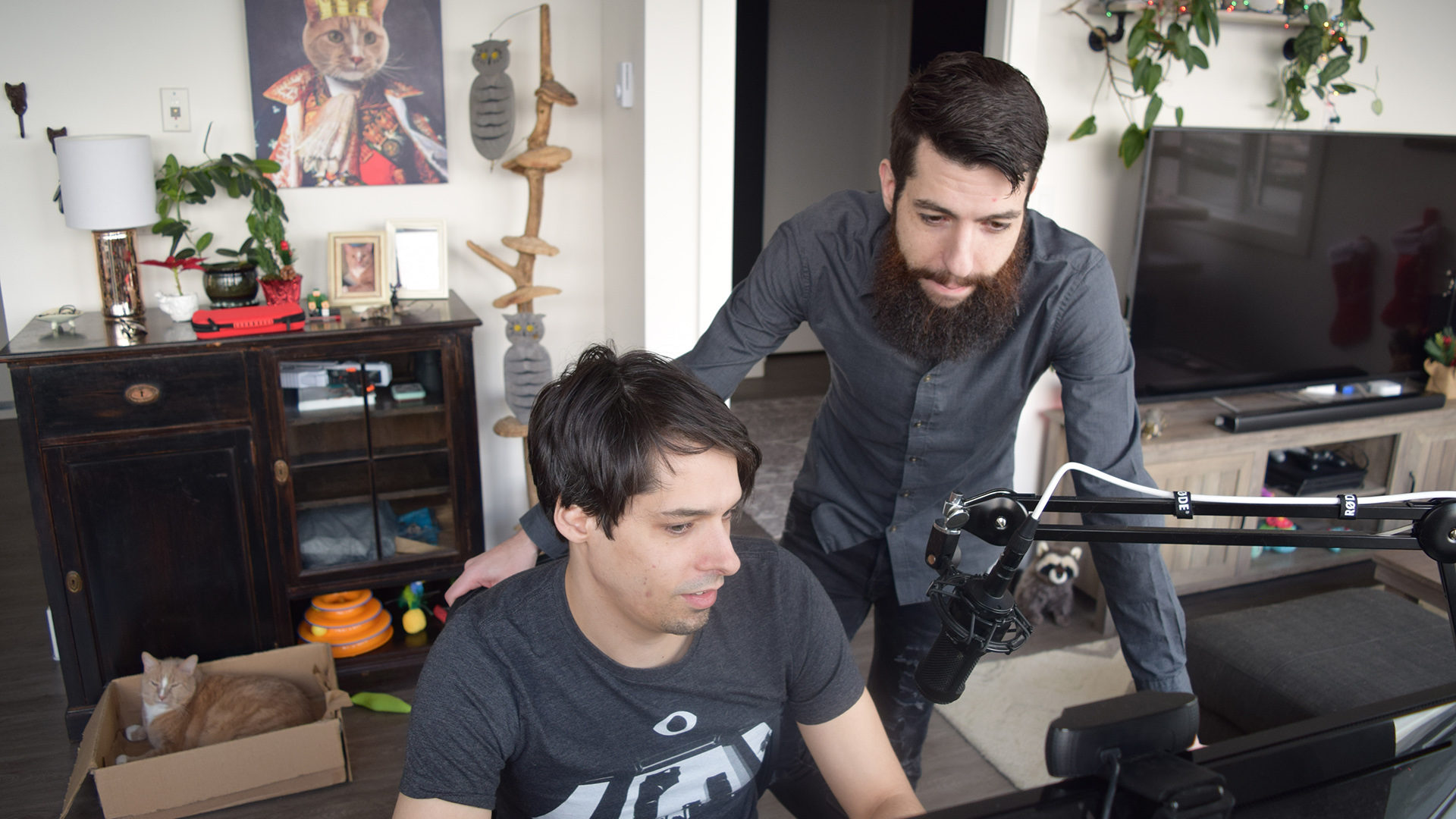
Credit: Omri Wallach for EGM
Instead, they’ve continued to make their highly regarded sounds right at home, though it helps that three of the five have apartments only a few blocks apart. While not quite the same as peeking up from your desk or walking to someone’s office, the team is still able to meet together to hash out problems and bounce ideas, usually over a bowl of ramen.
Not that working from home doesn’t come with its own set of obstacles. One is that each member works with different acoustics, so completed sounds and sections get vetted on everyone’s systems. Another is the fact that you’re dealing with loud and often repetitive sounds in residential buildings. Everyone tries to work during reasonable hours, but sudden deadlines can make some evenings difficult.
“Sometimes it’s happened where on 7 p.m. the night a trailer is due, we’ll get the final cut to edit for midnight,” Regamey said. “And when editing trailers, you’ll just hear the same five seconds over and over again. I’ll just text my neighbors and say, ‘I’m sorry but I need to do this tonight.’”
Yet despite the relatively simple setups, Power Up Audio’s sound work has earned accolades. Regamey’s audio work on Celeste—created inside a workspace one of his friends once called “absolute trash” for its acoustics—won Best Audio at the 2019 Game Developers Choice Awards.
“It’s important to know the shortcomings of your space, and to know your chops,” Godard said. “I don’t necessarily think that a million-dollar mixing room is going to make the game sound twice as good.”
Ask any audio designer and they’ll agree: Good sound can come from anywhere if you’re creative. Each member of Power Up has their own stories to tell in that vein. For Super Meat Boy Forever, Verderber used a bowl of pasta for some of the game’s sounds. For Celeste, Regamey recorded his footsteps on as many surfaces as he could, walking on gravel, pavement, paths, and even his fire escape. When Tangsoc needed sounds that would take too long to find in the library, he got his recorder and started tapping every surface in his apartment and rattling glass bottles inside his fridge.
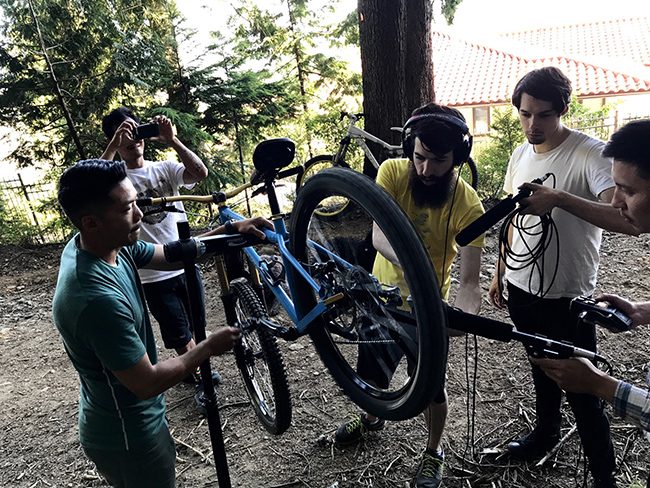
Courtesy Power Up Audio
Power Up Audio rose to success by going the extra mile on projects, so it’s stuck to the habit. For mountain bike racing game Descenders, the team found some of their most avid biking friends, drove to the mountains north of Vancouver, and started recording. But it wasn’t enough, since the sounds were impossible to isolate from each other. The solution was to design a custom bike made of, basically, just the wheels.
“It’s two front forks, no chain, no pedals,” Regamey said. “We found a welding company, showed them a blueprint, and the guy had no idea what it was for but he made it.”
The team’s dedication has earned Power Up many fans in the development world, a reputation that’s allowed them to take on bigger and bigger titles. The list of ongoing projects that they could tell me about includes the anticipated Darkest Dungeon 2 and Super Meat Boy Forever, the early-access Subnautica: Below Zero, and the recently announced single-player League of Legends spin-off, Ruined King.
But when it comes to the gaming public and press, you rarely see mention of the studio. When the Power Up team reads reviews for games they work on, there might be mentions of the ambience or immersive environments, but only once in a blue moon will there be talk about the game’s sound. Good sound work is, by its nature, seamless and easy to overlook.
Still, the recognition Power Up has gotten from fans and other developers goes a long way in validating their efforts. It allows them to continue putting their all into games, just as they have since Power Up started. In turn, their devotion helps to make the games enjoyable. The team likes to have a lot of fun with their games, and some extremely dedicated fans have discovered Easter eggs they’ve left in, what Regamey calls “content for no one.”
Some of the secrets, however, are almost impossible to figure out, such as the Fanatic boss in Darkest Dungeon’s The Crimson Court DLC. One of the enemy’s attacks puts a party member on a burning stake as screams echo in the background. Those screams come courtesy of the development team at Red Hook Studios, who Power Up invited to come record live.
Another example is from the animal RTS Tooth and Tail, for which Regamey went above and beyond, creating an entire language based on Russian. “We wanted to convey and communicate the idea of a crowd, but not draw attention, so we couldn’t use English,” Regamey said. “The game is also similar to the Soviet revolution, so I made a cipher that takes English phonetics, puts them through the meat grinder, and they come out almost Slavic.”
At the end of the day, the work that Power Up Audio does is for themselves, their fans, and their games. Even though some sounds take hundreds of iterations to perfect, the team has no complaints. After coming from projects and companies that gave them no motivation, creativity, or agency, they’ve created a sound studio where they can work on games that matter to them in a way they can be proud of.
“People get really focused on what they see,” Regamey said. “But the thing is, there’s a lot of nuance to it. They don’t see what’s happening off-camera, and there’s lots of sound. There’s so much more.”
Header image: Verderber, Godard, and Tangsoc at Godard’s workstation. Omri Wallach for EGM.
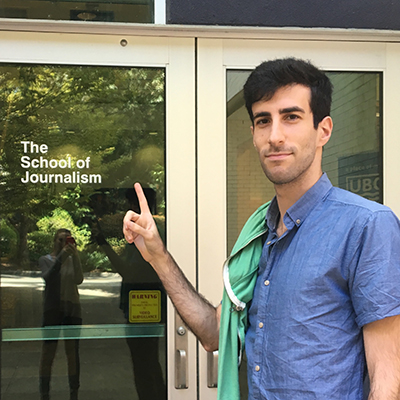
Omri Wallach is a journalist and writer of all things games, business, and culture based in beautiful rainy Vancouver, BC. Please send him your tips, opinions, and memes @om_wallach.